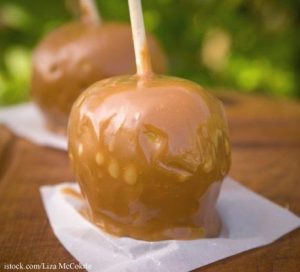The current Listeria monocytogenes outbreak that has sickened at least 29 people in 10 states has been linked to commercially prepared, prepackaged caramel apples sold in several major grocery store chains and big box stores. Recalled caramel apples were sold at Safeway, which has been named in a lawsuit, Walmart, and Sam’s Club in several states. In Minnesota, apples associated with the outbreak were sold at Cub, Kwik Trip, and Mike’s Discount Foods. These apples are a seasonal product and are no longer available in stores, but consumers may still have them in their homes.
 The investigation into this outbreak is ongoing, and more stores may be named as officials learn more. For now, if you purchased a prepackaged caramel apple at one of those stores from August to December, 2014, and you still have it in your home, discard in a sealed container or return to the place of purchase for a refund. Listeria monocytogenes bacteria can grow easily at room temperature and at refrigerator temperatures, so you must also clean your kitchen with a mild bleach solution to kill any bacteria that may be present. The government is advising consumers to avoid eating any prepackaged, commercially made caramel apples until further notice.
The investigation into this outbreak is ongoing, and more stores may be named as officials learn more. For now, if you purchased a prepackaged caramel apple at one of those stores from August to December, 2014, and you still have it in your home, discard in a sealed container or return to the place of purchase for a refund. Listeria monocytogenes bacteria can grow easily at room temperature and at refrigerator temperatures, so you must also clean your kitchen with a mild bleach solution to kill any bacteria that may be present. The government is advising consumers to avoid eating any prepackaged, commercially made caramel apples until further notice.
Three companies that produce caramel apples have issued recalls in connection with this outbreak: they are Happy Apple, California Snack Foods Karm’l Dapples, and Merb’s Candies Bionic Apples and Double Dipped Apples (sold in St. Louis and through mail order nationwide). If you purchased any of these products, return them to the place of purchase for a refund. Other brands associated with the outbreak that were sold in Minnesota are Carnival and Kitchen Cravings.
Listeria attorney Fred Pritzker, who has won millions for clients sickened by this bacteria, said, “I am not aware of prior listeriosis outbreaks linked to apples but Listeria is a bacteria that thrives in all kinds of food processing environments. It is a very sturdy bacteria that loves the cool damp environment common in food processing plants. The bacteria can multiply at temperatures as low as 34 degrees. This is why every food processor needs to take steps to prevent Listeria contamination.”
If you ate any of these products, monitor yourself for the symptoms of Listeria monocytogenes food poisoning for 70 days after consumption. That’s how long it can take for the symptoms to appear. The apples were last produced in November, 2014. They have a shelf life of about a month, so if you purchased an apple in November and ate it in early December, watch yourself for illness until mid-February. Write down the dates you purchased and/or ate the products on a calendar.
The symptoms of listeriosis, the illness caused by this bacteria, include flu-like fever and muscle aches, upset stomach, nausea, diarrhea, stiff neck, headache that may be severe, loss of balance, confusion, or convulsions. Unfortunately, pregnant women may have serious complications if they contract listeriosis, including miscarriage and stillbirth, even though their illness may be very mild. This bacteria can also cause infection in newborn babies.
Three children aged 5 to 15 have developed Listeria meningitis, another serious complication of listeriosis, after eating these products. And five people have died; three as a result of their infections, and two others who ate the apples but had other health conditions. If you do get sick, see your doctor as soon as possible for treatment.




